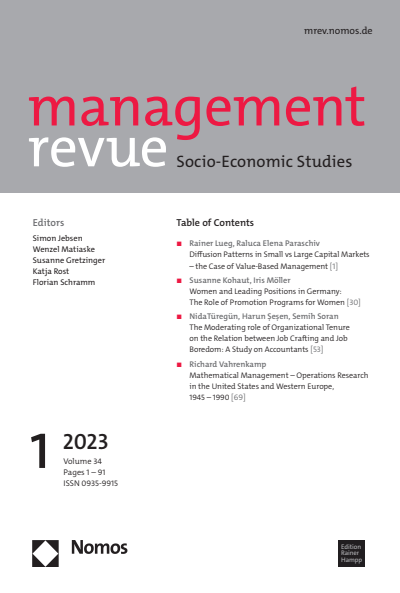Corporate Social Responsibility in the Dock. How Persuasive Strategies Support Verbal Accounts in the Event of Loss of TrustArticle received: September 30, 2017Revised version accepted after double blind review: February 11, 2019
IF 1.7
0 MANAGEMENT
引用次数: 1
Abstract
This paper conceptualizes the editor´s question of a possible trust-or-fake dilemma of Corporate Social Responsibility with a rhetorical lens on CSR-Reporting. From a rhetorical point of view, the speaker has to persuade the stakeholders as its audience of the claim: “we are socially responsible”. If the argumentation is judged by the audience as sound, it would trust the organisation. If not, the claim “we are socially responsible” will be judged as a fake. The paper concentrates on the following research questions: - 1. How do organisations employ argumentation to persuade their stakeholders of their corporate social responsibility? - 2. How do they argumentatively cope with the problem of different stakeholder demands? - 3. How do affective appeals interact with the argumentation? With the help of the rhetorical framework various concepts from trust repair literature and neo-institutional theory could be integrated to deepen our understanding of a trust or fake dilemma. Literature on CSR-reporting mainly discusses the gap between talk and action. We focus on another point, the relevance of the CSR-arguments. We introduce several concepts taken from argumentation theory like the distinction between context-abstract and field-dependent topoi and between warrant-using and warrant-establishing argumentation schemes in order to examine companies´ reactions to a loss of trust in their CSR-claim. Drawing on Mayring (2014), a mixed-method approach for content analysis was employed for the empirical analysis. The empirical case study contributed to the model building during the research process and illustrates the application of the model. We identified different phases of the verbal account strategy of Deutsche Bank. In these phases we found remarkable differences in the employment of warrant-establishing and warrant-using argumentations. We found also differences in the use of field-dependent topoi and categorized them following organisational façades.被告席上的企业社会责任在失去信任的情况下,说服策略如何支持口头陈述文章收稿日期:2017年9月30日双盲审查后接受修订版本:2019年2月11日
本文从企业社会责任报告的修辞角度,对编辑提出的企业社会责任可能存在的“信与假”困境进行了概念化。从修辞的角度来看,演讲者必须说服利益相关者作为其主张的听众:“我们是有社会责任的”。如果听众认为论点是合理的,他们就会信任该组织。否则,“我们对社会负责”的说法将被视为虚假。本文主要研究以下几个问题:- 1;组织如何运用论证来说服利益相关者他们的企业社会责任?- 2. 他们如何处理不同利益相关者需求的问题?- 3。情感诉求是如何与论证相互作用的?在这一修辞框架的帮助下,可以整合信任修复文献和新制度理论的各种概念,从而加深我们对信任或虚假困境的理解。关于企业社会责任报道的文献主要讨论的是“言与行”之间的差距。我们关注另一点,即企业社会责任论点的相关性。我们从论证理论中引入了几个概念,比如上下文抽象和领域相关的拓扑之间的区别,以及使用权证和建立权证的论证方案之间的区别,以检查公司对其企业社会责任主张失去信任的反应。借鉴Mayring(2014),采用内容分析的混合方法进行实证分析。实证案例研究有助于在研究过程中建立模型,并说明模型的应用。我们确定了德意志银行口头账户策略的不同阶段。在这些阶段中,我们发现在权证成立和权证使用论证的使用上存在显著差异。我们还发现了使用领域相关拓扑的差异,并根据组织结构对其进行了分类。
本文章由计算机程序翻译,如有差异,请以英文原文为准。
求助全文
约1分钟内获得全文
求助全文
来源期刊

Management Revue
MANAGEMENT-
CiteScore
1.20
自引率
0.00%
发文量
7
期刊介绍:
Management Revue - Socio-Economic Studies is an interdisciplinary European journal that undergoes peer review. It publishes qualitative and quantitative work, along with purely theoretical papers, contributing to the study of management, organization, and industrial relations. The journal welcomes contributions from various disciplines, including business and public administration, organizational behavior, economics, sociology, and psychology. Regular features include reviews of books relevant to management and organization studies.
Special issues provide a unique perspective on specific research fields. Organized by selected guest editors, each special issue includes at least two overview articles from leaders in the field, along with at least three new empirical papers and up to ten book reviews related to the topic.
The journal aims to offer in-depth insights into selected research topics, presenting potentially controversial perspectives, new theoretical insights, valuable empirical analysis, and brief reviews of key publications. Its objective is to establish Management Revue - Socio-Economic Studies as a top-quality symposium journal for the international academic community.
 求助内容:
求助内容: 应助结果提醒方式:
应助结果提醒方式:


